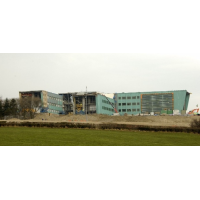InfoLab21

When it opens its doors in July, InfoLab21 will be at the cutting edge of academic-business collaboration. Not only will the building provide world-class research facilities in Information and Communication Technologies (ICT) for academic staff and students, it will also house a centre providing facilities for skills-training and technology transfer and incubation of high-tech companies based on University expertise.
With funding from the Northwest Development Agency and the European Regional Development Fund, Infolab21 brings together two academic departments - the Computing Department and the Department of Communication Systems. In addition, the Knowledge Business Centre will provide business incubation support facilities linked to the university's ICT research activities. Large companies, SMEs and start-ups will all be represented here.
"We are highly rated in terms of research," says InfoLab21's Director, Professor David Hutchison. "The challenge for us is to exploit this to benefit the 'third mission' activities of the university, namely technology transfer, industry training, exploitation and innovation.
"For a long time we have worked on the research side with companies. What we are doing now with InfoLab21 is to have a purpose-built home for that work, a focal point to help persuade companies to co-locate some of their staff with us. The geography of the building is important for the social mix - research and commercialisation sitting alongside each other, so that one will grow out of the other."
InfoLab21's mission is to become the premier location for ICT research and development in the region and to be the focal point for the development of ICT business in the North West and beyond. There is a specific intention to create start-ups and spin-off companies emerging from the work of the departments and any associated industrial organisations. But InfoLab21 is also keen to see larger, well-established companies collaborating with the University.
"We want to see four or five large companies come into InfoLab21 and take space in the Knowledge Business Centre in order to pursue effective collaborative projects, " says Roderick O'Brien, the University's Director of Enterprise and Commercialisation.
"We want them in because this is the way to establish longer term commercial activity in the Lancaster area. Once they are here they will have a need for smaller service companies. This way, you start generating activity."
With a 10-year plan in place and targets set, what's important for InfoLab21 is that the companies to whom it reaches out are prepared to reach in and commit to the project. "We are happy for companies to keep intellectual property but in return we want them to commit to an overall programme of activity," says O'Brien.
For further information go to http://www.infolab21.lancs.ac.uk/